Modular construction has become increasingly popular over the years: constructed off-site, the building is conducted under controlled plant conditions, using the same materials as conventionally built facilities, but can be completed in half the time
It’s this speed that makes modular construction attractive, and has been tipped as the solution to the current housing shortage faced in the UK. However, that can only be the case if the right skills are developed amongst workers. Here, industrial machinery suppliers and manufacturers Daltons Wadkin, discuss five key skills to ensure excellence in the off-site construction process, to achieve only the highest of standards.
Currently, only 10% of total construction is modular, so there is room for growth. By the end of 2020, the UK government wants to have built 1 million new homes, yet in 2015, only 142,890 houses were built, (way below the target of 250,000).
Approximately 15,000 modular homes are constructed in the UK each year, with a major constraint being the small number of factories in the country that are able to actually produce these homes. Nevertheless, 67% of builders who were surveyed, predicted that off-site construction will play a key role in new home construction, simply due to the speed of the build.
Modular construction requires workers to be equipped with the ability to seamlessly move between off-site and on-site requirements; and this requires training. However, there are three main barriers to getting this training:
- Current construction training doesn’t include the modular construction sector
- Training that is specific to modular construction is done in-house – whilst it’s good there’s training available, it means there’s no ‘standard’ that needs to be met
- There is a shortage of qualified training providers and assessors within modular construction.
Once these three issues have been overcome, we can start to make progress in increasing the number of modular constructions built. However, it’s also crucial that these five skills are developed, in order to ensure excellence in every build.
Digital Design
Also referred to as Design for Manufacture and Assembly (DfMA), this is a crucial skill when designing buildings off-site. Building Information Modelling (BIM) enables you to conduct 3D and 4D modelling and testing, which makes it easier to predict the performance and function of a structure. This is crucial so that modifications can be avoided further down the line.
Effective ways to gain digital design skills include getting a degree or HND, as well as on-the-job training. Important aspects of this function include data management, as that will affect project delivery; in addition to information management for the lifecycle of the asset.
Time and price estimation
Being able to estimate accurate pricing and timing is a crucial skill for off-site construction, as you’ll need to take into account both deadlines and time restraints.
Whilst these skills will naturally be improved with experience, it’s important to get estimations that are near the reality.
Pricing will change depending on the materials used and the factory output; whereas timing is largely dependent on the speed of workers, and potential restraints and hold-ups.
Even something that sounds as simple as ordering concrete is an art. How much concrete do you need for a build? How much will that cost? This in itself is a skill when it comes to ensuring excellence in modular construction.
Off-site logistics
Logistics for off-site construction covers many areas: from the planning through to transportation and supply chain management. It also covers the logistics of incorporating off-site and on-site, with the arrival of the goods on-site.
Yes, there are differences between factory and on-site logistics, which is why you need skills in the off-site section.
Project management skills are of utmost importance, as you’ll be overseeing the whole off-site process for modular construction. This includes speaking with suppliers and coordinating timings, which ties into the ability to offer accurate estimations.
Don’t forget to consider transportation, as it’s crucial: what’s the point in creating a building if you can’t move it to where it needs to be? Picking the correct mode of transport that will keep your building safe is key, and is a skill that needs to be developed in order to demonstrate excellence in this area.
Off-site manufacture
This is usually undertaken in a factory environment, and requires skills in creating the components and/or entire buildings for your modular construction.
This function encompasses many skills: welding, steel fixing, joinery, quality testing, and machinery operations. Each function has its own set of techniques that must be learnt, in order for you to consider yourself skilled in this area.
Not to mention, a multi-skilled worker is deemed more valuable than one person who knows just one process.
Placement and assembly On-Site
Being able to accurately and precisely place components of a building prior to the assembly is a skill in itself, and one that is required to ensure total excellence in modular constructions. If you have one small component that’s slightly out of place, then you’ll slow down speed, accuracy and cost of the entire project.
Other skills in this area include quality assurance and process management (this refers to knowing which tests to undertake on which products), in addition to problem-solving.
To conclude, it’s clear that modular constructions have their attractions, but they’re not being utilised to their full potentials. These five skills can help you to achieve excellence in future off-site builds, so if you’re not investing in training now, then it’s time you should.














